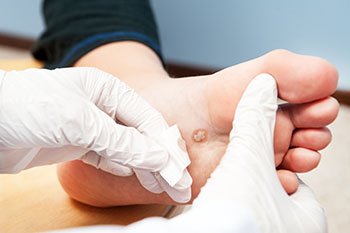
Nongenital cutaneous warts, often found on the feet and toes, are caused by strains of the human papillomavirus, or HPV. These warts may appear as rough, thickened areas and sometimes grow inward due to pressure from walking. Treatment depends on the location, size, and persistence of the wart. Topical salicylic acid can help in mild cases by gradually peeling away layers of the wart. Cryotherapy, which uses liquid nitrogen to freeze the wart, is a common in-office procedure. Other methods include laser therapy, chemical treatments, or immune-based therapies to stimulate the body’s natural defense. In some cases, a minor surgical procedure may be required to remove deeply rooted or stubborn warts. Avoiding barefoot walking in public areas can help prevent future infections. If you have a persistent wart on your foot that is painful or not responding to treatment, it is suggested you see a podiatrist for a diagnosis and appropriate treatment.
Plantar warts can be very uncomfortable. If you need your feet checked, contact one of our podiatrists from Nola Sole Podiatry. Our doctors will assist you with all of your foot and ankle needs.
About Plantar Warts
Plantar warts are the result of HPV, or human papillomavirus, getting into open wounds on the feet. They are mostly found on the heels or balls of the feet.
While plantar warts are generally harmless, those experiencing excessive pain or those suffering from diabetes or a compromised immune system require immediate medical care. Plantar warts are easily diagnosed, usually through scraping off a bit of rough skin or by getting a biopsy.
Symptoms
- Lesions on the bottom of your feet, usually rough and grainy
- Hard or thick callused spots
- Wart seeds, which are small clotted blood vessels that look like little black spots
- Pain, discomfort, or tenderness of your feet when walking or standing
Treatment
- Freezing
- Electric tool removal
- Laser Treatment
- Topical Creams (prescription only)
- Over-the-counter medications
To help prevent developing plantar warts, avoid walking barefoot over abrasive surfaces that can cause cuts or wounds for HPV to get into. Avoiding direct contact with other warts, as well as not picking or rubbing existing warts, can help prevent the further spread of plantar warts. However, if you think you have developed plantar warts, speak to your podiatrist. He or she can diagnose the warts on your feet and recommend the appropriate treatment options.
If you have any questions, please feel free to contact our office located in New Orleans, LA . We offer the newest diagnostic and treatment technologies for all your foot care needs.
